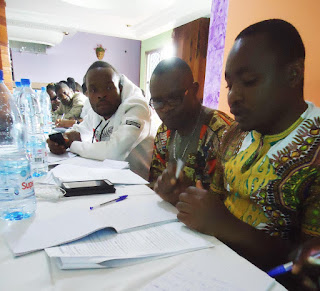Might peace journalism put reporters at greater risk?
(CAMEROON)—Threats against journalists seem to lurk
everywhere in Cameroon. Many of the journalists we talked to in Bafoussam and
Bonaberi said that one of the best ways to mitigate those risks is to practice
responsible peace journalism.
Today, their colleagues at a four day peace journalism
workshop disagreed. They say practicing peace journalism will actually put them
at greater risk of threats, intimidation, incarceration, or kidnapping. Why?
One journalist said that reporting about humanitarian issues, as peace
journalism asks, will anger officials who don’t want to such issues. Another
journalist said the word peace itself may incite anger by either side of the
conflict—from separatists who think peace means that you are opposed to their
goal, and from authorities who believe peace means acceding to the separatist’s
demands.
Also today, the journalists from throughout Cameroon engaged
in some preliminary planning for upcoming, contentious events in Cameroon like
the opening of school, the separatist’s independence day on Oct. 1, and the
presidential election on Oct. 7.
This four day workshop is sponsored by the Center for Global Peace Journalism at Park University, the Cameroon Community Media Network, and the Fredrich Ebert Foundation.






